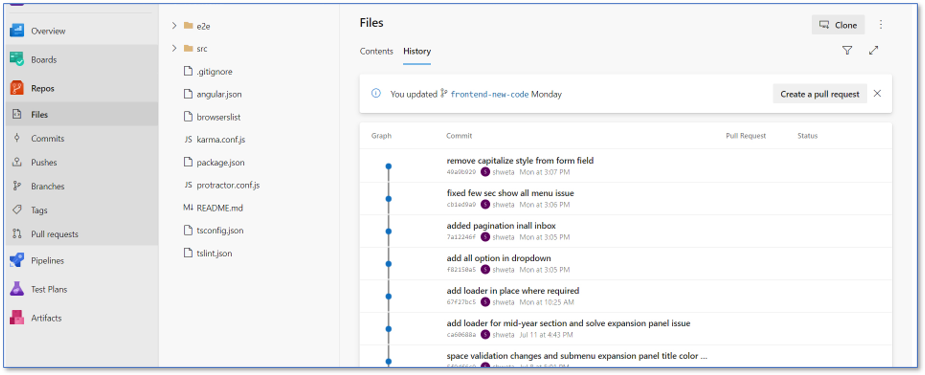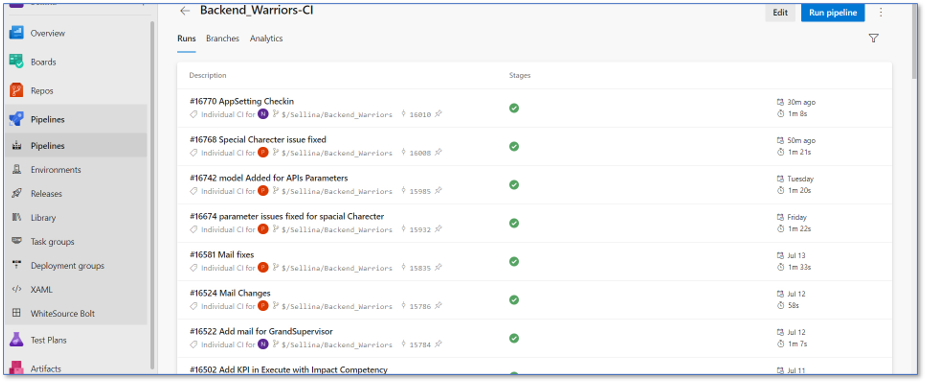Azure DevOps, Driven Automation: Top-Tier Indian FMCG Enterprise

In this digitally advanced era, organizations are under constant pressure to deliver faster, more efficiently, and with higher quality. Azure DevOps automation combines processes, tools, and practices to enhance a team’s or organization’s ability to achieve these goals. By streamlining build and deployment processes, it allows teams to focus on their products, foster collaboration, embrace a growth mindset, and drive change through technology.
In this case study, we explore how we helped one of our clients overcome their challenges, automate their operations, and boost overall efficiency with Azure DevOps automation.
About the Client
The client is a coveted FMCG enterprise in India, having a strong market presence in the Asia-Pacific and Middle Eastern markets. It is known for its diversified range of products and a large-scale distribution network; therefore, operational excellence, innovation, and customer satisfaction have been put forth as key engineering factors for sustaining its lead in a fiercely competitive consumer goods market.
It faced several challenges and decided to hire Bloom as their consultant. We assisted them in upgrading their operations by implementing Azure DevOps automation.


What Were the Requirements?
The major functional requirement was to develop a lightweight digital platform that would allow the performance evaluation and monitoring of sales teams. These include secure access via Azure AD, integration with Sales and HR data sources, real-time tracking of performance, analytics, Azure DevOps automation, and automated reporting to ease evaluation, lessen manual effort, and create more time for data-driven decision-making.
-Developing a digital platform to evaluate and monitor sales team performance.
-Building a lightweight Web portal so that it is easy to use and access.
-Integrate with Azure Active Directory (Azure AD) for secure access control.
-Connect to Sales and HR data sources for centralized data management.
-Allow real-time performance tracking and analytics.
-Include automated report generation to speed up evaluation and reduce manual interventions.
What Were the Challenges?
The main challenge was the balancing act between operational efficiency and control without choosing to increase manpower or to compromise system stability. Given below are the detailed challenges:
With limited internal IT resources, they had to manage not only the web application itself but also the database and assets.
From an operational viewpoint, the client wished to avoid having a full-time operations team on standby to guarantee availability, reliability, and performance.
In addition, deployment and maintenance processes had to be further streamlined to never allow downtime due to manual interventions.
At the same time, compliance with stringent IT governance and security policies would result in another layer of intricacy to the operations.
Thus, the client was searching for a solution that could automate deployment and monitoring while sticking to enterprise compliance standards.
What is the Solution We implemented for the Client?
The problem-solution was to improve the software delivery process through Azure DevOps automation. The team cooperation resulted in less manual work, better interaction, and the release of software that was faster and more reliable through the use of automation, source control, and CI/CD pipelines. Early issue detection and continuous deployment enhanced code quality, stability, and overall efficiency.
Automation of Build and Deployment: An automated build and deployment process was implemented using Azure DevOps automation, which minimized manual intervention and errors.
Source Control Management: Azure Repos was utilized to manage the central code repository, keep track of changes, and maintain code integrity.
Continuous Integration (CI): CI pipelines were set up to run Unit and API tests automatically, and thus, validating new code changes would be done quickly and reliably.
Early Issue Detection: The team was able to identify and fix issues faster through automated testing, thus improving code quality and stability.
Continuous Deployment (CD): CD pipelines were put in place to automatically release applications in production environments, which resulted in reduced deployment time and effort.
Shortened Release Cycles: The combination of Azure DevOps CI/CD pipeline enabled the team to speed up the delivery process, making releases quicker, more predictable, and repeatable.
Improved Collaboration: Azure DevOps automation allowed the developers and operations teams to concentrate on coding and quality improvement instead of manual deployment tasks.
How Did Our Client Thrive Thereafter?
By implementing Azure DevOps automation for their build and deployment processes, we helped them achieve higher-quality software, faster releases, seamless upgrades, reduced operational effort, and increased team productivity, empowering them to thrive and scale efficiently.
Enhanced Focus on Quality: The complete automation of build and deployment processes allowed the development team to write first-rate code, conduct extensive testing, and promptly fix any problems without the distraction of manual deployment.
On-Time Project Completion: Azure DevOps automation and the usage of streamlined workflows were the main factors for the project being delivered according to schedule, as they eliminated waiting times that repetitive manual operations or deployment bottlenecks would have caused.
Faster and Repeatable Deployments: The introduction of CI/CD pipelines has turned every build and deployment into a process that is consistent, reliable, and repeatable, thereby lessening the impact of human errors and cutting down on production release downtime.
Improved System Availability: Rolling updates and other automated processes worked together to deliver application updates without any downtime. Azure DevOps automation granted users uninterrupted access and high availability.
Reliable Upgrades with Rollbacks: The automated pipelines not only helped in carrying out upgrades safely but also provided a mechanism to automatically roll back changes in case of failures, thus guaranteeing system stability and compliance with operational standards.
Reduced Operational Burden: The manual efforts of monitoring and intervention were so minimized that the operational costs were reduced, and the team could then devote their time and skills to more strategic tasks.
Increased Team Productivity: The team could now shorten the development cycles, deliver more quickly, and keep up a higher productivity level throughout the project, all thanks to Azure DevOps automation of the repetitive deployment and testing tasks.
The project significantly benefited from the combined advantages of automation, reliability, and quality focus, in terms of overall efficiency, performance, and governance.
How Bloom Can Help?
Bloom Consulting Services directs organizations in a hassle-free transition to Microsoft Azure DevOps automation. Having worked on 20+ projects, we not only help in setting up, automating, and optimizing the DevOps processes but also provide training, support, and guidance on best practices to increase efficiency, minimize mistakes, and facilitate making data-driven decisions.
Smooth DevOps Transition
The transition to Microsoft Azure DevOps Services can be the most significant step for any organization, and for businesses in the FMCG sector, face unique challenges such as adapting to new systems, mastering the tools, managing costs, and handling uncertainties. Bloom Consulting Services simplifies this journey, with Azure DevOps for FMCG industry, ensuring a seamless shift from traditional or manual workflows to modern, automated DevOps environments.
Expert Guidance and Planning
With 20 Azure DevOps projects, Bloom has acquired a thorough understanding of the various parts of the DevOps ecosystem. We evaluate your organization’s current processes, point out deficiencies, and suggest an optimal way based on your business requirements, ensuring the transition is both efficient and cost-effective.
Implementation Support
Azure DevOps for enterprise at Bloom offers direct support in deploying Azure DevOps automation solutions, including the setup of Azure Repos, Pipelines, Artifacts, and Test Plans. We ensure that development, testing, and deployment workflows are fully automated, integrated, and aligned with industry best practices.
Training and Enablement
To give power to the team, we conduct training sessions that are elaborate, covering Azure DevOps tools, processes, and CI/CD best practices in Azure. The staff are trained in such a way that they can easily manage CI/CD pipelines, perform automated testing, and monitor deployments. Therefore, the organization grows a culture of continuous improvement.
Ongoing Assistance and Optimization
Bloom not only provides Azure DevOps implementation support but also offers continuous monitoring, optimization, and maintenance of the DevOps pipeline. With our help, your organization can identify bottlenecks, improve efficiency, and ensure compliance with IT governance standards.
Risk Mitigation
It is Bloom’s practice that by utilizing automation, best practices, and our project experience, the organization is equipped with reliable, repeatable, and predictable deployments, thus minimizing errors, reducing downtime, and facilitating releases.
Business Value Realization
The aim of our effort is that the adoption of Azure DevOps automation should empower the business with faster time-to-market, better-quality software, improved collaboration, and, most of all, make the management team able to take data-driven decisions with confidence.
To know more about our services, please visit: https://www.bloomcs.com
India: +91 70280 18244
info@bloomcs.com
https://www.bloomcs.com
Singapore: +65 9163 0654
Frequently Asked Questions
Q1: What is Azure DevOps automation, and how does it improve development efficiency?
Azure DevOps automation, among others, is one of the essential practices in software development that is likely to improve efficiency. The process entails building, testing, and deploying through CI/CD pipelines, thus reducing manual labor and speeding up the delivery process.
Q2: What is one of the real-world Azure DevOps case studies demonstrating measurable results?
A global enterprise improved release frequency by 60% and reduced deployment errors by automating builds and tests using Azure DevOps Services.
Q3: How does a CI/CD pipeline work in Azure DevOps?
A CI/CD pipeline in Azure DevOps works in such a way that all applications are automatically built, tested, and deployed regardless of the changes made in the system. This process guarantees the continuous flow of integration and delivery while very little human input is required.
Q4: What are the key steps in Azure DevOps implementation?
The implementation comprises evaluating existing workflows, creating repositories, tuning the pipelines, testing automation, and combining the monitoring tools for the ongoing feedback loop.
Q5: Can you provide an Azure DevOps success story from an enterprise environment?
By implementing Azure DevOps pipelines and automated testing frameworks, a leading retailer slashed software release timelines from a few weeks to low hours.
Q6: How can large enterprises benefit from Azure DevOps?
Large companies are using Azure DevOps automation to have a single view of their projects, to run their CI/CD pipelines in a more scalable way, to have their code stored safely, and to allow smooth interaction among their teams that are scattered across different locations.
Q7: How is Azure DevOps used in the FMCG industry?
With Azure DevOps automation as a powerful technology, FMCG companies launch new products faster, automate marketing analytics pipelines, and coordinate multiple regional development teams efficiently.
Q8: What are some CI/CD best practices in Azure?
Use environment-based pipelines with automated testing, secrets secured in Azure Key Vault, and rollback strategies that guarantee stable deployments.
Q9: What is DevOps pipeline automation, and why is it critical?
Pipeline automation eliminates manual dependencies in software delivery, so releases are faster, with fewer errors, and the quality of the application is consistent in nature.
Q10: Why are FMCG companies adopting Azure DevOps solutions?
Fast-moving consumer goods organizations use Azure DevOps automation system for handling frequent releases, integration with real-time data analytics, and efficient collaboration between IT, marketing, and supply-chain teams.
















